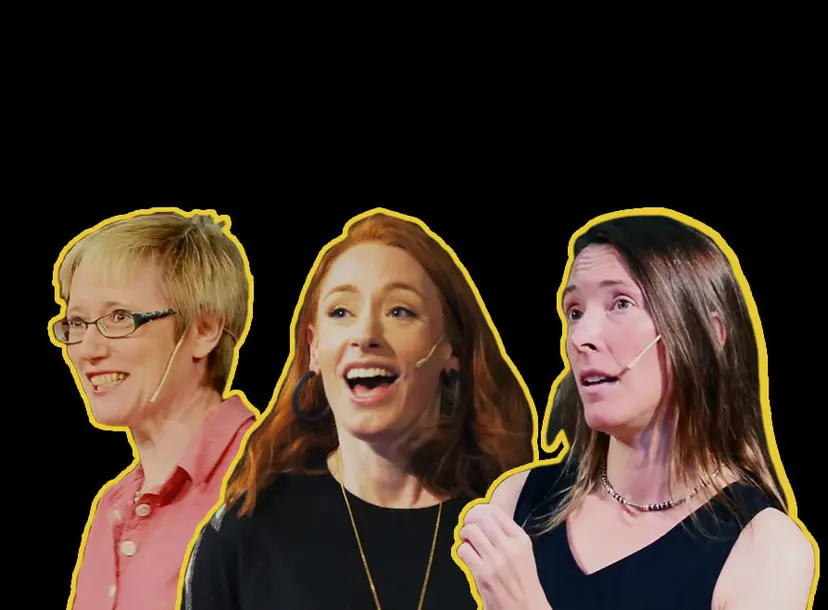1. Tara Shears – Antimatter: Why the anti-world matter
Antimatter, an identical, oppositely charged version of normal matter, is one of the most mysterious substances in the Universe and very little of it survives today. Tara Shears examines the progress being made towards understanding this elusive version of matter, and explains the latest results from LHCb and elsewhere.
2. Kate Lancaster – The extreme world of ultra-intense lasers
Since their invention, lasers have come to revolutionise our lives through their practical applications such as data transport and CD/DVD players, and as a tool for industry and science. The largest and most powerful lasers in the world can be used to make some of the most extreme conditions possible on earth.
Scientists around the globe are using these lasers to try to miniaturise particle accelerators, make astrophysical conditions in the lab, and create fusion energy. Plasma physicist Kate Lancaster leads us through this extreme world with demonstrations along the way.
3. Hannah Fry – Should Computers Run the World?
Algorithms are increasingly used to make decisions in healthcare, transport, finance and security. How can they best be used and what happens when things go wrong?
Mathematician (and 2019 Christmas Lecturer), Hannah Fry, takes us on a tour of the good, the bad and the downright ugly of the algorithms that surround us. She lifts the lid on their inner workings, to demonstrate their power, expose their limitations, and examine whether they really are an improvement on the humans they are replacing.
4. Aoife McLysaght – Copy number variation and the secret of life
Evolution is powered by variation: the differences in DNA sequences. One hugely important form of difference is copy number variation, where genes are duplicated or deleted from one generation to the next.
Geneticist Aoife McLysaght explains how copy number variations gave us colour vision, a sense of smell and haemoglobin in our blood, before exploring the role they play in diseases such as cancer, autism and schizophrenia.
Aoife was also our 2018 Christmas Lecturer, together with Alice Roberts.
5. Suzie Sheehy – Particle accelerators reimagined
Accelerator Physicist Suzie Sheehy explains how particle accelerators actually work, highlighting her research controlling high-power proton beams and thinking about what they may be capable of in the future.
6. Judith Mank – The Evolution of Males and Females
Males and females in many species are often quite different from one another. The sex of an individual can have profound effects on how an organism behaves, how it looks, how it lives and, in some cases, even how it dies. These differences are the product of different evolutionary forces acting on males and females, sometimes creating substantial conflicts between the sexes.
In this talk, Judith Mank gives a quick tour of how sex is genetically programmed and how sex differences evolve. Geneticist Judith Mank leads a tour of how sex is genetically programmed and how sex differences evolve.
7. Nessa Carey – What is epigenetics?
DNA is a vitally important starting point for life, but it's how it's used by cells and organisms that is really important.
Epigenetics is a rapidly moving field that has transformed our understanding of how one set of genes can create the masterpiece that is each of us. It's also leading scientists into unexpected and exciting areas such as new ways to treat disease, understand drug addiction or unravel the lifelong consequences of early childhood trauma.
Geneticist Nessa Carey presents an introduction to epigenetics and explains how it shapes life.
8. Fay Dowker – The story of spacetime
Fay Dowker tells the story of general relativity and its interactions with Newtonian physics, from Galileo to cutting edge research on the granularity of spacetime.
Fay is Professor of Theoretical Physics at Imperial College London and works on the problem of quantum gravity. Her research is based on the hypothesis that spacetime is fundamentally granular or atomic, and she has done numerous public lectures.
9. Lucie Green – A journey to the centre of the sun
110 times wider than Earth; 15 million degrees at its core; an atmosphere so huge that Earth is actually within it: come and meet the star of our solar system. What is going on in there? What are light and heat? How does the sun produce them and how on Earth did scientists discover this?
Physicist Lucie Green takes us on a journey from the centre of the sun to planet Earth in a run-down of the latest solar physics research.
10. Jo Dunkley – Our universe and how It works
Where did the Universe come from, and where is it going? Could our universe be one of many and how come it keeps expanding at an ever-increasing rate?
Astrophysicist Jo Dunkley traces the evolution of the Universe from the big bang fourteen billion years ago, past the birth of the Sun and our planets, to today and beyond. She explains cutting-edge debates about such perplexing phenomena as the accelerating expansion of the universe and the possibility that our universe is only one of many.
Learn something new every week
We post interesting lectures spanning a breadth of STEM topics on our YouTube channel each week. Subscribe to make sure you don't miss a thing.
